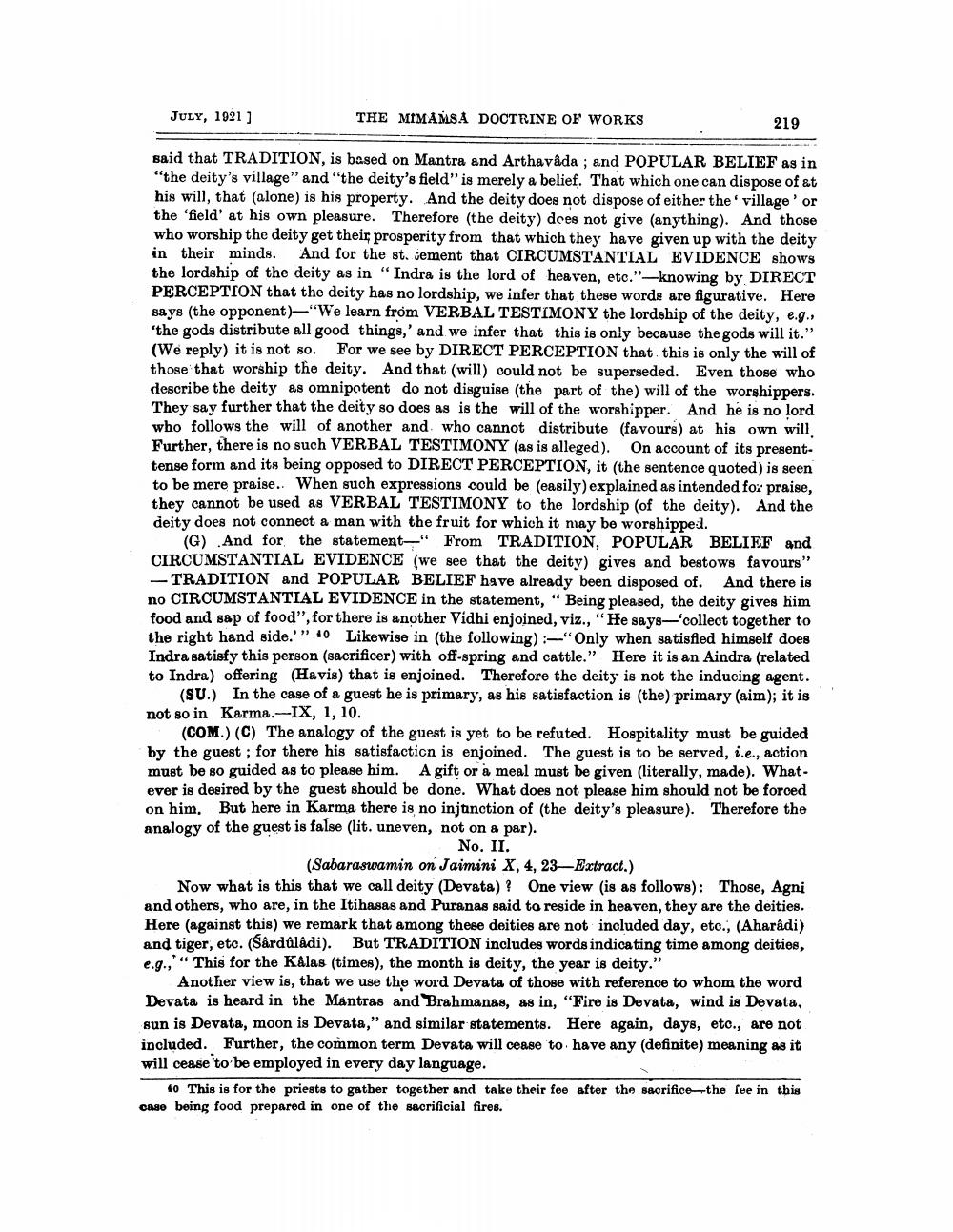________________
JULY, 1921]
THE MIMANSA DOCTRINE OF WORKS
219
said that TRADITION, is based on Mantra and Arthavada ; and POPULAR BELIEF as in "the deity's village" and "the deity's field" is merely a belief. That which one can dispose of &t his will, that (alone) is his property. And the deity does not dispose of either the village' or the 'field' at his own pleasure. Therefore (the deity) does not give anything). And those who worship the deity get their prosperity from that which they have given up with the deity in their minds. And for the st. cement that CIRCUMSTANTIAL EVIDENCE shows the lordship of the deity as in "Indra is the lord of heaven, etc."-knowing by DIRECT PERCEPTION that the deity has no lordship, we infer that these words are figurative. Here says (the opponent)-"We learn from VERBAL TESTIMONY the lordship of the deity, e.g., 'the gods distribute all good things,' and we infer that this is only because the gods will it." (We reply) it is not so. For we see by DIRECT PERCEPTION that this is only the will of those that worship the deity. And that (will) could not be superseded. Even those who describe the deity as omnipotent do not disguise (the part of the) will of the worshippers. They say further that the deity so does as is the will of the worshipper. And he is no lord who follows the will of another and who cannot distribute (favours) at his own will Further, there is no such VERBAL TESTIMONY (as is alleged). On account of its presenttense form and its being opposed to DIRECT PERCEPTION, it (the sentence quoted) is seen to be mere praise.. When such expressions could be easily) explained as intended foz praise, they cannot be used as VERBAL TESTIMONY to the lordship (of the deity). And the deity does not connect a man with the fruit for which it may be worshipped.
(G) And for the statement" From TRADITION, POPULAR BELIEF and CIRCUMSTANTIAL EVIDENCE (we see that the deity) gives and bestows favours"
- TRADITION and POPULAR BELIEF have already been disposed of. And there is no CIROUMSTANTIAL EVIDENCE in the statement, "Being pleased, the deity gives him food and gap of food", for there is another Vidhi enjoined, viz., "He says-'collect together to the right hand side.'" 10 Likewise in the following) :-"Only when satisfied himself does Indra satisfy this person (sacrificer) with off-spring and cattle." Here it is an Aindra (related to Indra) offering (Havis) that is enjoined. Therefore the deity is not the inducing agent.
(SU.) In the case of a guest he is primary, as his satisfaction is (the) primary (aim); it is not so in Karma.--IX, 1, 10.
(COM.) (C) The analogy of the guest is yet to be refuted. Hospitality must be guided by the guest ; for there his satisfaction is enjoined. The guest is to be served, i.e., action must be so guided as to please him. A gift or a meal must be given (literally, made). Whatever is desired by the guest should be done. What does not please him should not be forced on him. But here in Karma there is no injunction of the deity's pleasure). Therefore the analogy of the guest is false (lit. uneven, not on a par).
No. II. (Sabaraswamin on Jaimini X, 4, 23—Extract.) Now what is this that we call deity (Devata)? One view (is as follows): Those, Agni and others, who are, in the Itihasas and Puranas said to reside in heaven, they are the deities. Here (against this) we remark that among these deities are not included day, etc., (Aharadi) and tiger, etc. (Sârdaládi). But TRADITION includes words indicating time among deities, e.g., " This for the Kalas (times), the month is deity, the year is deity."
Another view is, that we use the word Devata of those with reference to whom the word Devata is heard in the Mantras and Brahmanas, as in, "Fire is Devata, wind is Devata, sun is Devata, moon is Devata," and similar statements. Here again, days, etc., are not included. Further, the common term Devata will cease to have any (definite) meaning as it will cease to be employed in every day language.
40 This is for the priests to gather together and take their fee after the sacrifice-the fue in this onso being food prepared in one of the sacrificial fires.




